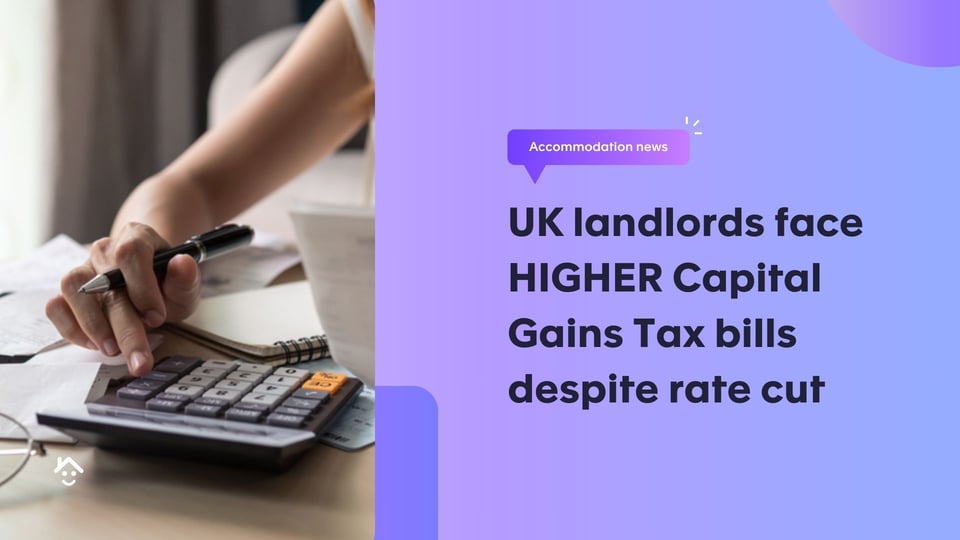UK landlords face HIGHER Capital Gains Tax bills despite rate cut

An analysis of the Capital Gains Tax (CGT) rate cut will see ALL lower-rate taxpaying landlords and 89% of higher-rate taxpayers seeing their tax bills rise when selling a property after April.
The findings from Hamptons highlight that the capital gains rate cut from 28% to 24% is expected to result in a £3,800 saving.
That's for a typical landlord paying tax at the higher rate when selling their BTL property for a £110,000 profit.
But Chancellor Jeremy Hunt's Spring Budget announcement also had a sting in the tail - the capital gains personal allowance will fall from £12,300 in 2022/23, £6,000 in 2023/24 and in 2024/25 it will be £3,000.
This reduction, coupled with the decrease in the higher-rate CGT, will result in an increase of approximately 4% or £454 to the average CGT bill.
'Hoping to encourage landlords to sell up'
Aneisha Beveridge, the head of research at Hamptons, said: “Although the Chancellor made it clear he was hoping to encourage landlords to sell up and add new housing supply into the market for first-time buyers, the reality is that the capital gains tax changes taken as a whole will likely act as a disincentive.
"Most landlords leaving the market this year will end up paying more tax than two years ago, not less."
She added: "Recent changes to CGT will hit landlords making the smallest gains hardest.
"Typically, these will be newer millennial investors who have seen less price growth, or those selling cheaper homes in less expensive parts of the country.
"Meanwhile, older investors who've been landlords for longer and have accumulated bigger gains are much more likely to benefit from the tax cut."
'CGT rates only apply to higher-rate taxpaying landlords'
Ms Beveridge also says: "The Chancellor's changes to CGT rates only apply to higher-rate taxpaying landlords with homes in their own names.
"Meanwhile, the growing number of investors with homes held in companies pay corporation tax on their sale proceeds after costs instead.
"While tax efficiency has been the major draw of a company structure, increasingly it's also the certainty and stability it offers.
"Chancellors' have generally proved less likely to tinker with company tax rules than individuals."
Landlords selling their investment properties
The firm's research is based on landlords selling their investment property at a profit of £110,000 on average compared to their purchase price and before deducting any allowable expenses.
But from April, despite the rate cut, 89% of higher-rate taxpaying landlords who are selling their properties will end up paying more tax than they would have two years ago.
The personal allowance change implies that all landlords paying tax at the lower rate will see their CGT bill increase from April, by an average of £1,674.
Hamptons says the CGT move is 'regressive'.
The research also highlights that landlords paying tax at the higher rate are making the smallest gains, and those who were wholly or mostly covered by the previous £12,300 personal allowance, will see the largest increase in bills both in percentage and absolute terms.
Lower personal allowance and lower tax rates
The combination of a lower personal allowance and lower tax rates means that any landlord paying tax at the higher rate who reports gains below £68,000 will find themselves worse off.
However, those reporting larger gains will find themselves better off.
Given that the average landlord who sold in 2023 (having bought since 1995) reported a gross gain of £110,000, it means almost all landlords, whether they are lower or higher-rate taxpayers, will find themselves paying more tax if they sell.
Those set to see their CGT tax bill rise the most will be both newer landlords who have owned homes for a shorter period alongside investors selling up in cheaper markets.
CGT bill for a higher-rate taxpaying landlord
The average CGT bill for a higher-rate taxpaying landlord who has owned a rented property for less than five years will rise by 9%.
Average bills for investors in the North East, who reported the lowest capital gains last year, will see their CGT bill rise by 14%, and there's a 9% rise for landlords in Yorkshire & Humber.
Meanwhile, long-term higher-rate taxpaying landlords who have owned for 20+ years will see a 4% or £734 fall in their average CGT bill.
'Gave with one hand and took with the other'
The managing director of Accommodation for Students, Simon Thompson, said: "This was a Spring Budget that gave with one hand and took with the other.
"The Chancellor made clear that the direction of travel is for landlords to sell up in favour of first-time buyers.
"But this research highlights that some landlords will take a hit on profits after years of hard work."
He added: "On top of this, seeing that all lower rate taxpaying landlords will be paying more in CGT is baffling and will put potential investors off."



